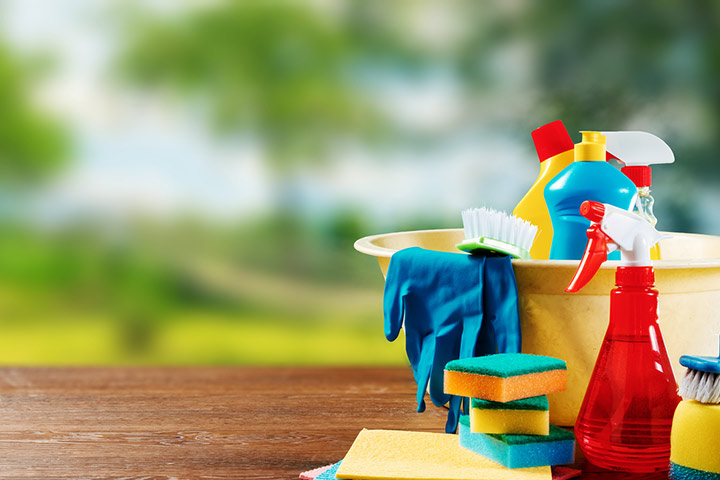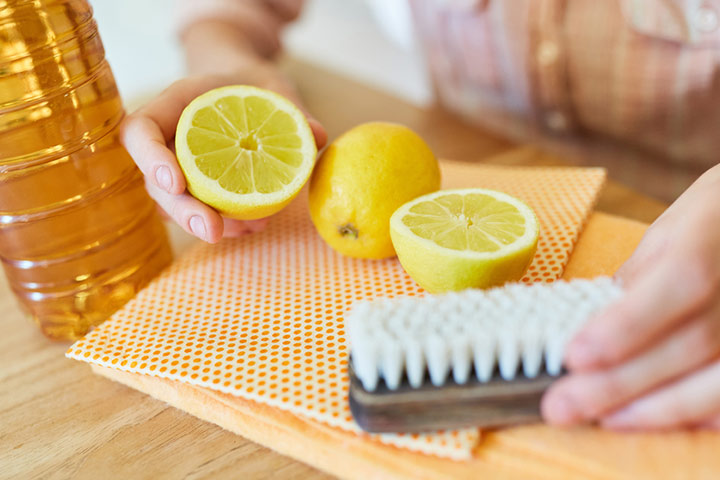
Image: Shutterstock
There are a lot of factors that contribute to your fertility. Age, lifestyle, sleep patterns, diet, and even the products that you use to clean your homes or wash your hair may have an impact on your health. Yes, you read that right. The chemicals present in the products you use to clean your house may affect your fertility. Though there have been debates about it, some studies suggest that common chemicals present in cleaning products affect sperm, egg, and embryo quality, thereby affecting your ability to have a baby (1). Curious to know more? Scroll below to find out which chemicals you should stay away from because they may affect your fertility.
A group of chemicals called Endocrine Disrupting Chemicals (EDCs) is known to decrease sperm, egg, and embryo quality, reducing the chances of having a baby. They can also potentially affect the long-term health of the baby (2). These EDCs occur naturally in the environment, but the amount is controlled and not as harmful. However, ever since the rapid industrialization after World War II, the amount of EDCs has drastically increased. Therefore, it’s best to be mindful of the products you use in your house.
Image: Shutterstock
Considering the number of products available in the market, where do you start? What products are harmful and what are not? There is an information overload about these products that it becomes hard for you to understand what to believe and what to stay away from. Don’t worry; we are here to help you. Besides, you just have to be cautious of the products you purchase and understand what toxins and chemicals are used. Read this article to know the harmful substances that you should stay away from:
According to the National Institute of Health, there has been a significant decrease in both men and women’s fertility levels due to increased toxins in the environment. A study says that the worst fertility disruptors are organochlorine compounds like chlorinated pesticides, polychlorinated biphenyls, and dioxins. These chemical compounds are found in cleaning and bleaching products like DDT (3).
Another harmful chemical is bisphenol A (BPA). According to the Center for Disease Control and Prevention, exposure to BPA occurs when you eat or drink out of plastic containers. BPA is used to manufacture polycarbonate plastics used for containers, dinnerware, toys, compact disks, etc. BPA epoxy resins are also used as a protective lining in food cans and other such products (4). You are surrounded by BPA products, and you probably don’t even know it.
BPA is not the only chemical used in plastic that may affect your fertility. A study found that a chemical called phthalates used to manufacture several plastic products and personal care products may decrease fertility. Researchers found that phthalates disrupted reproductive cycles and reduced the ability to become pregnant for up to nine months (5).
What Should You Do?
Image: Shutterstock
Exposure to such harmful chemicals in your household is alarming, and you might be lost about what to do. But we’ve got a simple solution for you. Try to switch to chemical-free products, especially if you’re worried about having fertility issues. Here are a few things you can do:
- Switch to glass water bottles instead of plastic bottles
- Say goodbye to Teflon and opt for stainless steel or ceramic
- Ditch hair care products with phthalates
- Switch to cleaning agents that use natural ingredients only
Now that you are aware of the harmful chemicals and their impact on your fertility, read the products’ labels before purchasing them. Avoid chemical products in general and try to switch to organic and natural products as much as possible. These simple changes to your lifestyle can really improve your health. Comment below and let us know your thoughts about this article. Don’t forget to share it with your near and dear ones!














